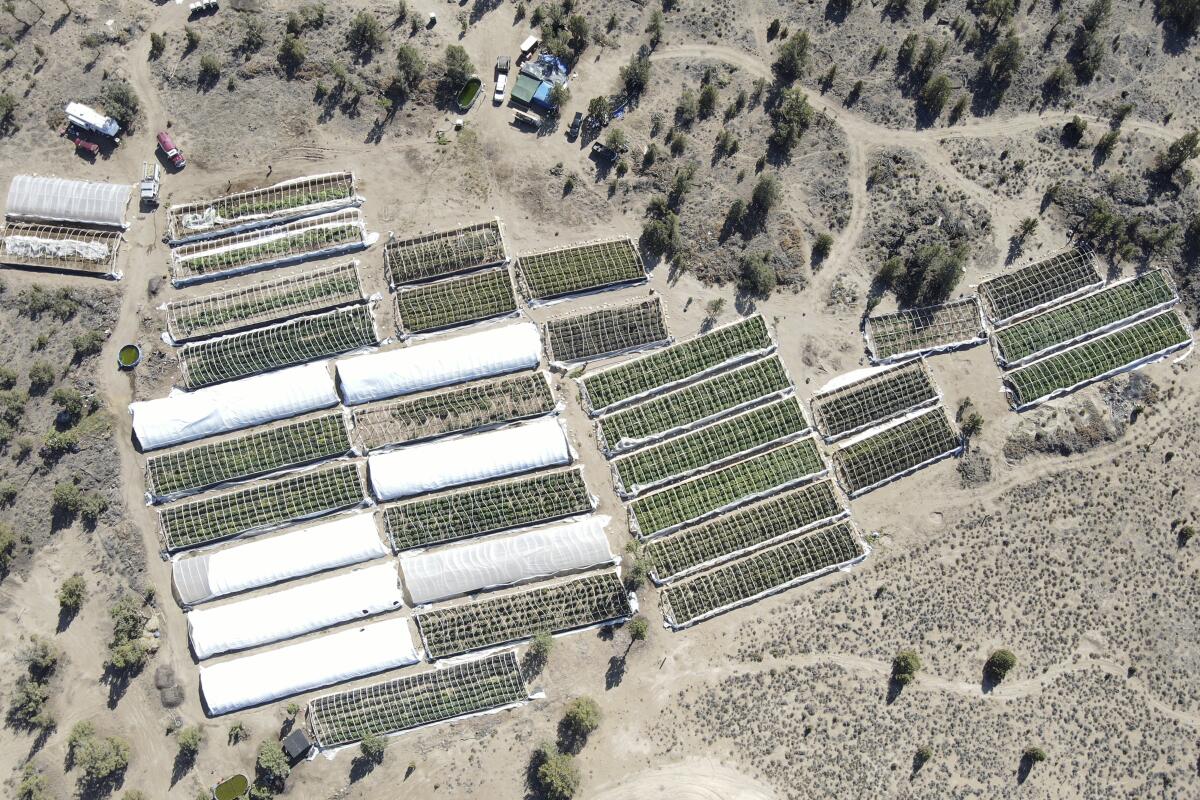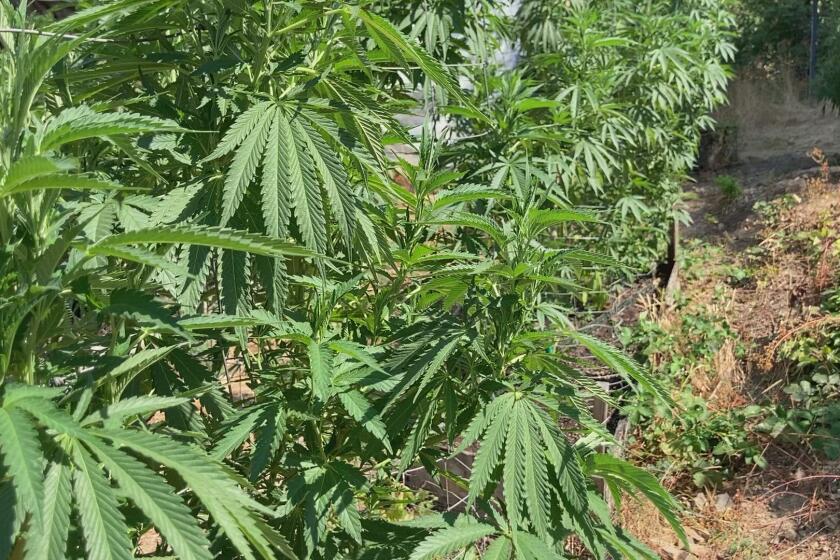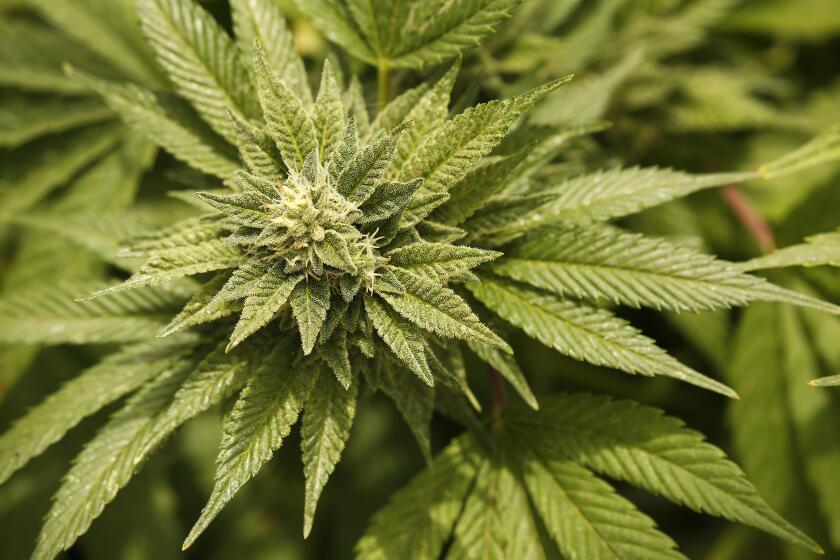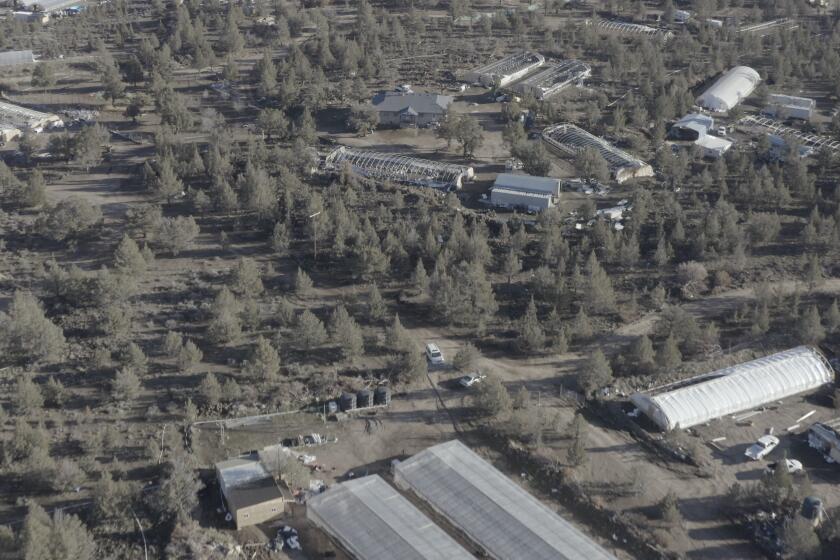Oregon, mecca of weed, to crack down on illegal pot growers by holding landowners responsible

- Share via
SALEM, Ore. — Oregon has long been known as a mecca for high-quality marijuana, but that reputation has come with a downside: illegal growers who offer huge amounts of cash to lease or buy land and then leave behind pollution, garbage and a drained water table.
Now, a bill passed by the Oregon Legislature seeks to tackle that by making the landowners themselves responsible for the aftermath. The bill also prohibits the use of rivers or groundwater at the illegal site, as well as criminalizes seizing the identity papers of migrant workers who tend the plants or threatening to report them for deportation.
Under the bill, local governments are authorized to file a claim of lien against property used for illicit marijuana, if the owner doesn’t pay for the cleanup.
A leader of the state’s cannabis and alcohol regulatory agency has said southern Oregon is to marijuana what Bordeaux is to wine. But the state faces challenges on two fronts: The regulated industry has a glut of product that has slashed prices and profit margins, and there has been huge growth in illegal pot farms operating under the guise of growing hemp, which became legal nationally in 2018.
After passing the Senate and House, the House Speaker Dan Rayfield signed the measure Wednesday, over the objections of some Republicans. Democratic Gov. Tina Kotek is expected to sign it next week.
California’s legalization of recreational cannabis in 2016 ushered in a multibillion-dollar industry. But many of the promises of legalization have proved elusive.
“This is just an assault on property rights here in the state of Oregon,” GOP Sen. Dennis Linthicum said on the Senate floor.
But Democratic Sen. Jeff Golden, of Ashland, said property owners should know something is amiss when they are “approached at the beginning of the growing season with requests to lease their property for tens, sometimes hundreds of thousand dollars for a single year.”
Witnesses have described backpacks with thousands of dollars in cash being handed over to landowners and getting numerous offers to buy.
“We pay CASH and offer a fast close,” says one letter received by a landowner last year, one of three offers.
State officials will audit corruption in cannabis licensing after a Times investigation uncovered allegations of bribery, conflicts of interest and other misdeeds.
Jackson County Sheriff Nathan Sickler told lawmakers that after police raid illegal pot farms, neither landowners nor the suspects make efforts to remove the cheaply built greenhouses, known as “hoop houses,” latrines, and other debris, including plastics and chemicals.
“Frankly, it’s an eyesore for our community, with no means to deal with it,” Sickler said.
Some two years ago, the ideal growing conditions began attracting criminal gangs from Mexico, Russia and other countries, police said. Thousands of hoop houses cropped up and police were overwhelmed, nailing only a fraction of the sites. Workers at these farms often live in squalid conditions and use open latrines, and they are sometimes cheated out of their pay.
Due to persistent police raids, which netted over 100 tons of illegal marijuana across the state last year, the grow sites have become smaller and more dispersed. For example, on Thursday, Josephine County Sheriff’s deputies and other officers raided a property in Cave Junction and destroyed about 2,000 marijuana plants and 100 pounds of processed marijuana.
Landowners who have been intimidated and suffered environmental damage from illegal grow sites are applauding the bill.
“At least most of the landowners knew what they were doing was wrong. I believe this measure will help to stem the tide,” said Jack Dwyer, who has a house near the community of Selma. In 2021, Dwyer said a large illegal grow site nearby siphoned all the water from a creek that runs through his property, causing it to run dry.
Christopher Hall, who works to engage the public in water stewardship, said the bill shows that Oregon officials understand the problem of large-scale illicit cannabis operations and are committed to solving it.
Illegal cannabis farms are engulfing parts of California and exploiting farmworkers who labor in squalid, deadly conditions, a Times investigation finds.
The illicit sites “not only turn streams into gravel roads but also lead to serious human rights violations and dumping of trash, sewage, chemicals, and other waste into ditches, riparian areas, and streams,” he said.
The Senate approved the measure before GOP senators began a walkout on May 3 over Democratic measures on abortion, gender-affirming care and gun safety. The House passed the marijuana bill on a 53-3 vote on May 31. The bill will now go to Kotek to sign into law, taking immediate effect.
“The governor supports cracking down on illegal cannabis operations that have been prevalent in southern Oregon,” said Elisabeth Shepard, Kotek’s spokesperson.
More to Read
Sign up for Essential California
The most important California stories and recommendations in your inbox every morning.
You may occasionally receive promotional content from the Los Angeles Times.













